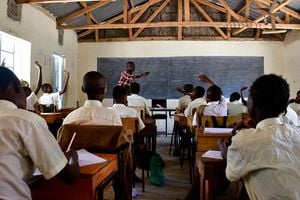
Parents purchase school items at Khimji Bookshop in Nyeri town on Saturday, January 06. Only a week after reopening, suppliers have dragged schools that owe them money to courts.
A week after schools reopened for the first term of the 2023 academic year, suppliers have dragged schools that owe them money to courts as principals ask the government to release billions of shillings they say have not been remitted to them under the Free Day Secondary Education (FDSE) programme since 2019.
This comes as the Ministry of Education last week disbursed Sh16.2 billion as first term allocation to secondary schools, but was silent on funding gaps despite admitting that the money sent to schools was inadequate.
The annual requirement is to fully fund all learners in public schools but the government has allocated Sh65.4 billion in the current budget, meaning the situation will only worsen for schools as suppliers shy away from doing business with them.
Management committees and school heads are now fighting the situation in court, warning that learning in many schools could grind to a halt if the situation is not resolved. In addition to the money owed by the government, parents also owe schools billions of shillings in school fees.
Also Read: The evolution of Kenya’s education system
However, parents have complained that some schools have increased fees beyond the amount set by the government. The Nation has seen some of the fee structures but could not immediately verify if the increased fees were authorised by the Ministry of Education as required by law.
Most of the schools that are in debt are in the sub-county category, which are day schools. This is because these schools rely entirely on government funding and do not charge other fees like boarding schools. Over 75 percent of all secondary school students attend day schools.
In Nyeri, suppliers have filed over 10 lawsuits at the Small Claims Court in the past four months.
“We have been relying on the goodwill of suppliers and if that goodwill wanes, many schools will be taken to court. Parliament must be forced to allocate funds for education,” said Mr Indimuli Kahi, the former chairperson of the Kenya Secondary Schools Heads Association (Kessha).
He put the total outstanding bill at Sh58 billion, a figure Education Cabinet Secretary Ezekiel Machogu last year said was Sh60,489,633,756. This was in response to a question in the Senate by Embu Senator Alexander Mundigi. Last year, 794,231 secondary school learners were left unfunded.
Under the FDSE programme, each learner is supposed to be allocated Sh22,244. However, due to reduced funding, this has fallen to about Sh17,000 per learner, leaving schools unable to meet their financial obligations. There are about 3.7 million students enrolled in secondary schools.
In one of the cases filed in court on September 21 last year, Jowaka Food Stores accuses Kangonye Secondary School’s board of management of failing to pay Sh794,000 after it supplied food to the institution between August 2022 and October last year. Court records show that the debt has since accrued interest to the tune of Sh1.176 million.
A court order shows that the case was settled by consent after the school agreed to pay the debt in instalments of Sh500,000, Sh345,000, Sh271,000 and Sh250,000 by June 30, 2025.
In another suit, Betch Construction Company Limited is demanding Sh800,000 from the management committee of Narumoro Girls High School.
According to the suit, the school hired the company to construct a dormitory and ancillary works that included demolition of an old building, asbestos removal, routing according to the National Environment Management Authority regulations and transportation of cotton soil.
The contractor is accusing the school of failing to pay for the additional works, which cost Sh750,000. In a ruling delivered by Resident Magistrate Eveline Gathuma on December 6 last year, the court allowed the parties to withdraw the case and merge it with another as it involved the same parties.
In the latest case filed before the court on Monday last week, Muiga K Hardware is accusing the management of Iria-ini Girls Secondary School of withholding Sh300,210 after the firm supplied assorted hardware products in late 2020 and early 2021. The matter will come up for mention before Resident Magistrate Gathuma on Monday next week.
At the Magistrate’s Court, Blue Valley Enterprises has sued the management of Komothai Girls Technical High School for withholding Sh3,736,285 after it built a dormitory block at the institution. In the suit filed in October last year, the contractor says it signed a contract with the school in which it agreed to pay the amount within a certain period.
Also Read: The making of powerful headteachers
According to Kenya Book Sellers and Stationers Association (KBSSA) Nyeri Chapter chairman Lawrence Muthitha, the association is owed a cumulative Sh2 billion by schools. He noted that the largest amount owed to a member of the association is Sh20 million by various schools.
Speaking to the Nation, a headmasters at a day secondary school in Central region said sub-county schools are mainly affected because parents are only required to pay Sh12,000 a year for meals.
“This means that headmasters depend solely on capitation grants from the government, which are often late and hardly enough,” the headmaster said.
The capitation grant provided by the government is meant to facilitate the education of the students and the running of the school, catering for textbooks, exercise books, laboratory equipment and chemicals, reference materials, library materials, teaching and learning materials, chalk, computers and computer accessories, desks and chairs, blackboards, and stationery.
According to the headmaster, some students are not registered in the National Education Management Information System because some do not have birth certificates, a requirement for registration. As a result, schools have been forced to spread government funding among the rest of the students. A parent of a student at a girls’ boarding school in Kiambu County told the Nation the school had added Sh8,000 to this term’s fees of Sh22,000 to settle outstanding bills.
“Inflation and the high cost of living have also played a major role in the crisis facing schools,” said Cyrus Wachira, the Nyeri County Kessha chairman.












